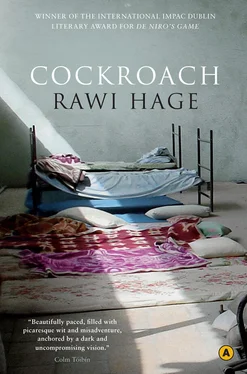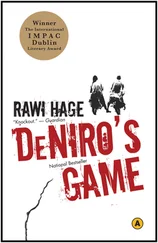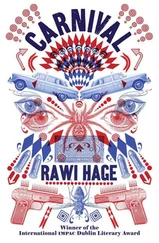I reminded myself that I can escape anything. I am a master of escape (unlike those trapped and recurring pink Buddhists). As a kid, I escaped when my mother cried, when my father unbuckled his belt, when my teacher lifted the ruler high above my little palm. I disappeared as the falling blows glowed across my hands like thunder across landscapes of lifelines — long journeys, and travellers’ palms. I watched the teacher’s ruler as if it wasn’t me who was receiving those lashes across fingers extended like noontide red above beaches lit by many suns. I alternated my six cockroach hands and distributed the pain of those blows. And when my palms burned and ached, I fanned my cockroach wings. I let the air cool off my swollen hands as I stood in the corner, my face and a tender belly to the wall.
But I escaped most when I stole sweets, pens, chewing gum, and, later on, cameras and cars. Primitive and uneducated as I was, I instinctively felt trapped in the cruel and insane world saturated with humans. I loathed the grown-ups who were always hovering above me and looking down on me. They, of course, ruled the heights: they could reach the chandelier, the top of the fridge; they could rumple my hair anytime they pleased. But I was the master of the underground. I crawled under beds, camped under tables; I was even the kind of kid who would crawl under the car to retrieve the ball, rescue the stranded cat, find the coins under the fridge.
When I was a teenager I met my mentor Abou-Roro, the neighbourhood thief. He realized I had the capacity to slip through anything. To help me reach the heights, he would fuse together his fingers and I would step on his locked and open palms, and he would lift me up to small windows that only vermin can go through. Once I was inside a house, a church, or a school, I would go straight for the valuables. I stole them all. You name it and I stole it. I crawled through windows and holes and gathered silver sets, crosses, change, watches. I even took my time to nibble leftovers and kitchen-counter crumbs.
The underground, my friend, is a world of its own. Other humans gaze at the sky, but I say unto you, the only way through the world is to pass through the underground.
OVER THE NEXT FEW days I called Reza’s place in vain. I banged on every door at every place I thought he might be, with rhythms that he himself could never replicate — a few tat-a-tat s here and there. Once I even experimented with a bouwang ! and a bou-doum ! But I could not find him. Forty dollars he owed me. Just imagine the soap I could buy, the rice, the yards of toilet paper I could line up, use to sweep the counter, mark territory and divide nations, fly like kites, dry tears, jam in the underground pipes and let everything subterranean rise to the surface. I would share it and cut it and divide it among the nation’s poor, fair and square. You name it, I would do it!
Reza, that charming compulsive liar, was a master charlatan who for years had managed to couch-surf in women’s houses, bewitching his hosts with his exotic tunes and stories of suffering and exile. His best and favourite story was how he almost lost all his fingers performing for the Ayatollah Khomeini. He usually told this story in bars after some fusion gig with an Anglo with an electric guitar or a Caucasian Rasta with a drum. He would tell the women gathered around him at the table how he was afraid and nervous when he was asked by the Iranian Hezbollah, the Guards of God, not to play anything subversive for the holy man, meaning no fast or non-religious tunes. Then, when he was finally pushed behind the door where the great leader of the Iranian revolution was sitting, he was so nervous that he forgot to kiss the great mullah’s hand, and even forgot to bow and murmur Al-salaam alaikum , which made the guards angry. He would relate how he’d sat on the floor tuning his instrument while sweat dripped down his spine, but once he started playing, he was transported (true to his art, to the artist that he was!). He forgot himself and played faster and faster. And here Reza would usually pause to gauge the women’s reactions and keep them in suspense, until one of them would ask: And then what happened? (And the woman who asked this was usually the one who would invite Reza to sleep over that night.)
Reza would continue his story, telling the women that he started to play fast and non-religiously and shook his head left and right, because when he plays he can’t help it, until one of the guards ran over to him and broke his instrument with one stomp of the foot and held Reza’s index finger in the air, bending it backwards, trying to break it, promising that this was the first of many broken bones to come. And if it hadn’t been for the Ayatollah Khomeini himself, who gave a slight wave of his hand and liberated Reza from the brute’s clutches, all the musician’s fingers would have been broken by now. And then the Musician of Love would end his story with a question: And you know what the consequences are for a musician like myself to have broken fingers, right? Gullible heads would nod, compassionate eyes would open, blankets would be extended on sofas and beds, fridges would burp leftovers, and if the rooster was lucky, it would all lead to chicken thighs and wings moistened by a touch of beer or wine, and hot showers seasoned by pizza pies delivered to the bedroom and gobbled in front of trashy movies on TV.
Once, when Reza and I were having an argument, and the topic shifted to each other’s lives and each other’s decadent methods of survival, I confronted him about his schemes and lies. He leaned his long face towards me and said: Brother, think of me as a wandering Sufi. I spread love and music, and in return I accept hospitality, peace, and love. Love, my friend — it is always about love. As he said this, his eyebrows danced and he swayed his musical head, dimmed his eyes, and smiled. I give something in return, he continued, while you are nothing but a petty thief with no talent. All you can do is make the fridge light go on and off, and once the door is closed you’re never sure if the light inside has turned to darkness like your own dim soul.
I cursed him to his face and told him that the day would come when all my power would surface from below. I shall bring up from the abyss the echoes of rodent and insect screams to shatter the drums of your ears! I told him. And then you won’t need to cut trees to carve music boxes, and no wire will be stretched, tuned, or picked, and all melody will come from the core of the beings whose instruments are innate inside them — insect legs making tunes as fine as violins, rodent teeth more potent than all your percussion, millions of creatures in sync, orchestrated, marching to claim what is rightly theirs. .
Reza laughed at me and walked away, humming. I knew it, he said. You are a lunatic. I always knew it — a loonnneyyyy.
FINALLY, I REACHED Matild again, Reza’s housemate, the beauty who still works at the French restaurant where I used to work. Lately I find the city is being invaded by whining Parisians like Matild, who chant the “Marseillaise” every chance they get. They come to this Québécois American North and occupy every boulangerie , conquer every French restaurant and croissanterie with their air of indifference and their scent of fermented cheese — although, truly, one must admire their inherited knowledge of wine and culture. These are skills to be secretly admired. Indeed, the Parisians are highly sought after and desired by the Quebec government. Photos of la campagne rustique, le Québec du nord des Amériques , depicting cozy snowy winters and smoking chimneys, are pasted on every travel agent’s door; big baby-seal eyes blink from the walls of immigration offices, waiting to be saved, nursed, and petted; the multicolours of Indian summers are plastered across every travel magazine; and le nouveau monde français is discovered on every travel show. The Québécois, with their extremely low birth rate, think they can increase their own breed by attracting the Parisians, or at least for a while balance the number of their own kind against the herd of brownies and darkies coming from every old French colony, on the run from dictators and crumbling cities. But what is the use, really? Those Frenchies come here, and like the Québécois they do not give birth. They abstain, or they block every Fallopian tube and catch every sperm before the egg sizzles into canard à l’orange . They are too busy baking, tasting wine, and cutting ham and cheese, too occupied intimidating American visitors who play the sophisticates by tasting and nodding at every bottle of French wine wrapped in a white cloth.
Читать дальше












